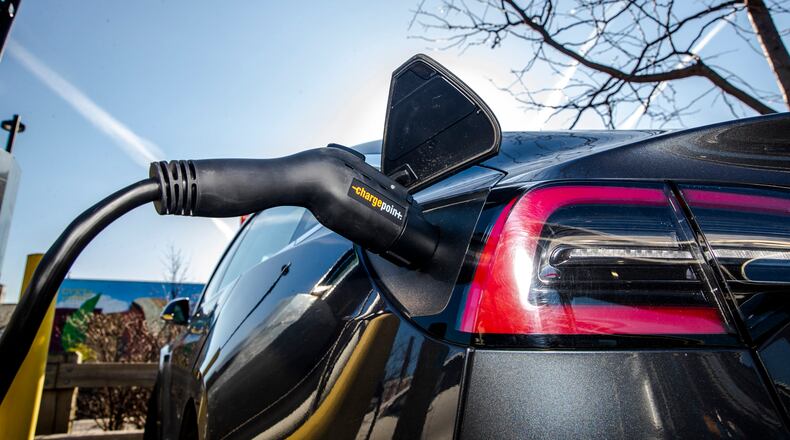The Biden administration released new domestic manufacturing standards Wednesday for federally-funded electric vehicle chargers and announced other investments officials say will help expand the country’s network of charging stations.
Officials say they hope expanding charger placement across major highways from coast-to-coast will encourage EV adoption and calm consumers’ “range anxiety.” The regulations will be overseen by the Departments of Transportation and Energy and are a critical part of Biden’s goal to make charging “as easy as filling up at a gas station,” according to a news release.
“No matter what EV you drive, we want to make sure that you will be able to plug-in, know the price that you’re going to be paying, and charge up with a predictable and user-friendly experience,” U.S. Transportation Secretary Pete Buttigieg said on call Tuesday ahead of the announcements.
Buttigieg had been scheduled to visit Georgia on Wednesday to tout public and private EV investment in the state, but his visit was postponed Tuesday night, a DOT spokesperson told The Atlanta Journal-Constitution.
Encouraging more drivers to choose EVs over gas-powered cars is at the center of President Joe Biden’s plan to rein in climate change and revive domestic manufacturing. Shortly after taking office in January 2021, Biden announced a goal for the U.S. to achieve net-zero emissions by 2050 and have EVs make up at least half of all new car sales by 2030.
Georgia has emerged as an EV hub, luring Hyundai Motor Group, Rivian, SK Battery and others to build factories in the state with generous tax breaks and other incentives. In return, the companies have promised to invest billions and create tens of thousands of manufacturing jobs.
Even more EV companies may be headed to the state. Last month, Gov. Brian Kemp said his goal is to make Georgia the “electric mobility capital of America” in his second term in office.
The General Assembly is also weighing new rules that will shape the EV charging experience and how much it costs to charge for years to come.
New ‘Made-in-America’ requirements
Effective immediately, the DOT said all new charging stations receiving federal funds must complete final assembly in the U.S., and that any external housing for chargers must also be manufactured domestically to be eligible. In the coming years, requirements for federally funded chargers will get even more stringent. By July 2024, at least 55% of all charger components will need to be built domestically as well, the agency said.
The new guidelines and investments are funded by money in Biden’s signature climate law — the Inflation Reduction Act (IRA) — and the Bipartisan Infrastructure Law (BIL), passed during Biden’s first year in office.
The Bipartisan Infrastructure law allocated $7.5 billion to build out a national network of 500,000 EV chargers, which the Biden administration hopes to have in place by 2030. The IRA also includes numerous incentives for the installation of EV chargers.
Both laws devoted billions to incentivize domestic EV and battery production, though changes in EV tax credits caused some heartburn for foreign automakers.
Last year, the DOT approved the plans of all 50 states to begin building a nationwide network of charging stations spaced along interstate highways at roughly 50 mile intervals. Among the other announcements Wednesday is the creation of a new, joint Office of Energy and Transportation to oversee the creation of a nationwide charging network.
The Department of Energy also announced $7.4 million in funding Wednesday for seven medium and heavy-duty charging projects and the development of hydrogen fueling infrastructure in 23 states. It was not yet clear if Georgia is among the states receiving that funding.
Since Biden and Vice President Kamala Harris took office, EV sales have tripled, with more than 3 million on the road, and the number of available charging ports across the country have grown by at least 40% to more than 130,000 public chargers, according to the release.
“Expanding the geography of opportunity to every zip code is a key part of the Biden-Harris approach to taking on the climate crisis,” White House National Climate Advisor Ali Zaidi said Tuesday. “Today’s public electric charger investment is bringing more coverage to the grid in rural and hard to serve communities.”
A note of disclosure
This coverage is supported by a partnership with 1Earth Fund, the Kendeda Fund and Journalism Funding Partners. You can learn more and support our climate reporting by donating at ajc.com/donate/climate/






